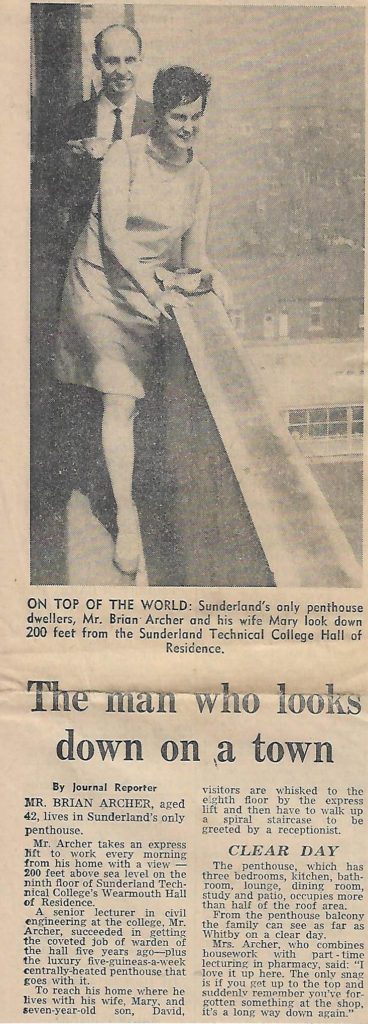In 1963 at the age of two David Archer had a unique view of Sunderland – living in the city’s only penthouse.
David’s parents met and taught at the University of Sunderland from the 1950s onwards, and his dad was warden of Wearmouth Hall student accommodation which was at the time Sunderland’s highest building. As a young child David lived on the top floor of the building.
Now, following his mother’s death earlier this year, David has made a donation to the university with the aim of keeping his parents’ legacy alive.
David, who now runs his own consultancy firm, Socia, in London, returned to the city of his birth this week to launch a new scholarship for Sunderland students, named in honour of his parents. The Mary and Brian Archer Opportunity Award will give opportunities and financial support to students who need a helping hand to get the best out of their time at university.
He says: “My dad started as a lecturer in 1955 in the Department of Civil Engineering, which had just been recently formed. My mum joined the same year in the Pharmacy Department and they met in the pharmacy lecture theatre attending a meeting of the College Staff Association.
“They married in 1957 and in 1963 became the first wardens of Wearmouth Hall, the big student accommodation block on Chester Road – which I was surprised to see no longer exists!”


Wearmouth Hall was demolished in 2008 to be replaced by the University’s Olympic-standard sports and recreation hub, CitySpace, in 2009.
David continued: “From when I was aged two to the age of seven, 1963 to 1968, we lived in at the top of Wearmouth Hall in the flat on the 13th floor. It was a strange place for a young lad to live, but my memories of it are very happy. I had immense freedom to run around the corridors and go and see my ‘friends’, the various students who lived there. I had a scooter and I was allowed to scoot up and down in the lift and around the corridors of Wearmouth Hall – I think they must have thought I was a real pain!”
When David was seven the family moved to East Boldon, in a house his parents lived in for the rest of their lives. David’s mother Mary went on to teach at Monkwearmouth FE College, while his dad Brian continued to work at the technical college, which became Sunderland Polytechnic and eventually the modern university, becoming acting head of the department of Civil Engineering up until his retirement in 1983.
“The University was a major part of both their lives, my dad’s work life and both their social lives. In the early days we were very involved with the students in the halls. The student Christmas parties were fantastic. There were a lot of Norwegian and Indian students, and many national celebrations. I still remember going to Diwali celebrations, which was a very new thing for Sunderland at the time.”
When he was 18 David moved away from Sunderland, first studying at Cambridge and then working in London and the south east, eventually setting up his own consultancy, Socia.
He says: “My mother moved into a great care home in Roker five years ago and we were able to visit her regularly, until sadly she passed away from Covid at the start of this year.
“One of the things my mother always loved was going to the National Glass Centre. Even when the weather wasn’t great she used to love looking out onto the river, and seeing all the kids going by on their bikes.”
Now David has returned to Sunderland to launch a new scholarship in honour of his parents.
“My mum and dad were very keen to see people apply what they had learned to the world. My dad was a civil engineer and he was really keen to see good engineering building good homes and good communities. My mum taught pharmacy and then nursing, and she taught many people who got into nursing in later life and realised that in order to progress they had to go back to learning. She was always wanting to open up opportunities for people.
“They were both about helping people realise their potential, and apply what they had learned to improve the world they were living in. When I was thinking how we could celebrate their lives I realised that the university had been a real constant throughout their lives.
“Places like the University of Sunderland are national institutions, but at the same time they’re really there for the people who live and work in the area. Sunderland really mattered to my parents, and it really matters to me.”















